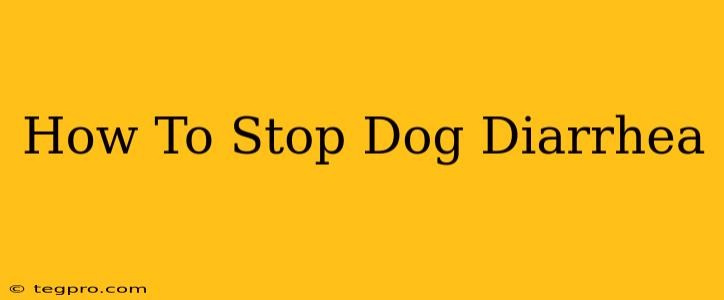Dog diarrhea can be a distressing experience for both you and your furry friend. It can range from a minor inconvenience to a serious health issue, depending on the cause and severity. This comprehensive guide will walk you through identifying potential causes, implementing effective home remedies, and knowing when to seek professional veterinary care.
Understanding the Causes of Dog Diarrhea
Before you can stop your dog's diarrhea, you need to understand what's causing it. Several factors can contribute to this common canine ailment:
Dietary Indiscretions:
- Sudden diet changes: Switching dog food brands or introducing new foods too quickly can upset their sensitive digestive system.
- Table scraps: Many human foods are toxic to dogs, while others simply cause digestive upset. Chocolate, onions, grapes, and raisins are particularly dangerous.
- Spoiled food: Eating spoiled food or garbage is a common cause of diarrhea.
Infections:
- Viral infections: Parvovirus and other viral infections can cause severe diarrhea, often accompanied by vomiting and lethargy.
- Bacterial infections: Bacteria such as Salmonella and E. coli can contaminate food and water, leading to diarrhea.
- Parasites: Intestinal parasites like worms and Giardia can cause chronic diarrhea and weight loss.
Other Causes:
- Stress: Changes in environment, travel, or even the arrival of a new pet can trigger stress-induced diarrhea.
- Medications: Certain medications can have diarrhea as a side effect.
- Underlying medical conditions: Conditions like inflammatory bowel disease (IBD), pancreatitis, and cancer can manifest as chronic diarrhea.
Home Remedies for Dog Diarrhea (When to Use Caution!)
For mild cases of diarrhea, some home remedies might help. However, it's crucial to monitor your dog closely and consult a vet if the diarrhea persists or worsens.
Withhold Food (for a short time):
A short period (12-24 hours) of fasting can sometimes help the digestive system rest and recover. Always provide fresh water.
Bland Diet:
Once the fasting period is over, gradually introduce a bland diet consisting of boiled chicken and rice. This is easily digestible and can help to firm up stools. Avoid seasonings and fats.
Probiotics:
Probiotics can help restore the balance of good bacteria in the gut. Always consult your vet before giving your dog probiotics, especially if they have underlying health conditions.
Pumpkin Puree (Plain):
Plain, canned pumpkin (not pumpkin pie filling) is rich in fiber and can help to regulate bowel movements. Introduce it gradually.
When to See a Veterinarian
It's essential to seek veterinary attention immediately if your dog exhibits any of the following:
- Severe diarrhea (watery, bloody, or persistent)
- Vomiting
- Lethargy or weakness
- Loss of appetite
- Dehydration (sunken eyes, dry gums)
- Fever
- Abdominal pain
- Diarrhea lasting longer than 24 hours
Preventing Dog Diarrhea
Prevention is always better than cure. Here are some tips to help prevent diarrhea in your dog:
- Maintain a consistent diet: Avoid sudden changes in food.
- Provide fresh, clean water: Always ensure your dog has access to clean drinking water.
- Supervise your dog around garbage: Prevent your dog from scavenging.
- Regular parasite control: Administer preventative medications as recommended by your veterinarian.
- Practice good hygiene: Wash food and water bowls regularly.
Dog diarrhea can be a serious issue, so don't hesitate to seek professional veterinary help if you're concerned. Early intervention can often prevent complications and ensure your dog's speedy recovery. Remember, this information is for general knowledge and should not replace professional veterinary advice. Always consult your vet for any health concerns related to your pet.

